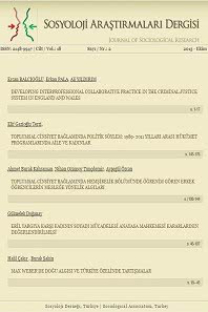Duygusal Örgütsel Bağlılık, Algılanan Örgütsel Destek ve Örgüt Temelli Öz-Saygı İlişkisi Üzerinde Bazı Demografik Faktörlerin Etkisi: Özel ve Kamu Sağlık Kuruluşu Çalışanları Üzerine Bir Araştırma
___
ALLEN, N. J. ve, J. P. MEYER 1990 "The Measurement and Antecedents of Affective, Continuance and Normative Commitment", Journal of Occupational Psychology,No: 63, s.1-18.ARMELI, S., R. EISENBERGER, P. FASOLO ve P. LYNCH 1998 "Perceived Organizational Support and Police Performance: The Moderating Influence of Socioemotional Needs", Journal of Applied Psychology, Cilt:83, No:2, s.288-297.
BAUMEISTER, R. F., J.D. CAMPBELL, J. I. KRUEGER ve K. D. VOHS 2003 "Does High Self-Esteem Cause Better Performance, Interpersonal Success, Happiness, or Healthier Lifestyles?" , Psychological Science in the Public Interest, Cilt:4, Sayi:l, s.1-44.
BLAU, G. J. ve K. BOAL 1987 "Conceptualizing How Job Involvement and Organizational Commitment Affect Turnover and Absenteeism", Academy of Management Review, No: 12, s. 288-300.
BROCKNER, J.1988 Self-Esteem at Work: Research, Theory and Practice, Lexington: Lexington Books.
CAMPBELL, J. D. 1990. "Self-Esteem and Clarity of the Self-Concept", Journal of Personality and Social Psychology, Cilt:59, No: 3, s. 538-549.
CARSON, K. D., P. P. CARSON, H. LANDFORD ve C. W. ROE 1997 "The Effects of Organization-Based Self-Esteem on Workplace Outcomes: An Examination of Emergency Medical Technicians", Public Personnel Management, Cilt: 26, No: 1, s. 139-155.
CHEUNG, C.-K. 2000 "Commitment to the Organization in Exchange for Support from the Organization", Social Behavior and Personality, Cilt: 28, No: 2, s.125-140.
DIXON, M. A., B. A. TURNER, G. B. CUNNINGHAM, M. SAGAS ve A. KENT I 2005 "Challenge is Key: An Investigation of Affective Organizational Commitment in Undergraduate Interns", Journal of Education for Business, Jan/Feb: 172-180.
EISENBERGER, R., R. HUNTINGTON, S. HUTCHISON ve D. SOWA 1986 "Perceived Organizational Support", Journal of Applied Psychology, Cilt:71, No:3, s. 500-507.
EISENBERGER, R., P. FASOLO ve Y. DAVIS-LAMASTRO 1990 "Perceived Organizational Support and Employee Diligence, Commitment, and Innovation", Journal of Applied Psychology,Cilt:75,No:l, s. 51-59.
EISENBERGER, R., L CUMMINGS, S. ARMELI ve P. LYNCH 1997 "Perceived Organizational Support, Discretionary Treatment, and Job Satisfaction", Journal of Applied Psychology, Cilt:82, No:5,, s.812-820.
MATHIEU, J. E. ve D. M. ZAJAC 1990"A Review and Meta-Analysis of the Antecedents, Correlates and Consequences of Organizational Commitment", Psychological Bulletin, Cilt: 108, No:2,, s.171-194.
MCCOLL-KENNEDY, J. R. ve, R. D. ANDERSON 2005 "Subordinate-Manager Gender Combination and Perceived Leadership Style Influence on Emotions, Self-Esteem and Organizational Commitment ", Journal of Business Research, Cilt:58, No:2, s.115-125.
MEYER, J. P., ve N. J. ALLEN 1988 "Links between Work Experiences and Organizational Commitment during the First Year of Employment: A Longitudinal Analysis", Journal of Occupational Psychology, Cilt:61, s. 195-209.
MEYER, J. P.,ve N. J. ALLEN 1991"A Three Component Conceptualization of Organizational Commitment", Human Resource Management Review, Cilt: 1, No:l,s.61-89.
MEYER, J. P., Stanley, D. J., Herscovitch, ve L. TOPOLNYTSKY, 2002. "Affective, Continuance and Normative Commitment to the Organization: A Meta-Analysis of Antecedents, Correlates and Consequences", Journal of Vocational Behavior, Cilt:61, No:l, s.20-52.
MOSSHOLDER, K. W., Bedeian, A. G., ve A. A. ARMENAKIS 1981"Role Perceptions, Satisfaction, and Performance: Moderating Affects of Self-Esteem and Organizational Level", Organizational Behavior and Human Performance, No:28,s. 224-234.
MOWDAY, R. T., Steers, R. M., & L. W. PORTER 1982Employee-Organization Linkages:The Psychology of Commitment, Absenteeism and Turnover. New York: Academic Press.
ÖZDAMAR, K. 1999 Paket Programlarla İstatistiksel Veri Analizi-1, Eskişehir: Kaan Kitabevi.
ÖZYER, KUBİLAY 2004 "Duygusal Zeka ile Örgütsel Bağlılığın Alt Formları Arasındaki İlişkilerin Saptanmasına Yönelik Ampirik Bir Araştırma", Hacettepe Üniversitesi SBE, Basılmamış Yüksek Lisans Tezi.
PIERCE, J. L., D.G. GARDNER, L.L. CUMMINGS ve R. B. DUNHAM 1989 "Organization-Based Self-Esteem: Construct Definition, Measurement, and Validation", Academy of Management Journal,No:32, s. 622-648.
PIERCE, J. L. ve D. G. GARDNER 2004. "Self-Esteem Within the Work and Organizational Context: A Review of the Organization-Based Self-Esteem Literature", Journal of Management, Cilt:30, No:5, s. 591-622.
RHOADES, L., R. EISENBERGER ve S. ARMELI 2001 "Affective Commitment to the Organization: The Contribution of Perceived Organizational Support", Journal of Applied Psychology, Cilt:86, No:5, s. 825-836.
RHOADES, L. ve R. EISENBERGER 2002 "Perceived Organizational Support: A Review of the Literature", Journal of Applied Psychology, Cilt:87, No:4, s.698-714.
UYSAL, GÜRHAN 2005 "İnsan Kaynakları Uygulamaları ve Örgütsel Bağlılık İlişkisi Üzerine Bir Araştırma",Hacettepe Üniversitesi Sosyal Bilimler Enstitüsü Basılmamış Doktora Tezi.
Wang, L, J. W. BISHOP, X. CHEN ve K. D. SCOTT 2002 "Collectivist Orientation as a Predictor of Affective Organizational Commitment: A Study Conducted in China", The International Journal of Organizational Analysis, No: 10, s. 226-239.
WASTI, ARZU 2002 "Affective and Continuance Commitment to the Organization: Test of an Integrated Model in the Turkish Context", International Journal of Intercultural Relations, No:26, s. 525-550.
- ISSN: 2148-9947
- Yayın Aralığı: 2
- Başlangıç: 2010
- Yayıncı: Sosyoloji Derneği
Nitel Araştırmalarda Veri Analiz Süreci ve Bilgisayar Programlarının Katkıları
Yeniköy'de Yaşayan Arnavut Göçmenler Üzerine Sosyolojik Bir Araştırma
Kimlikler Çağında Toplumsal Sınıf
Şehriban KAYA ŞAHİN, İbrahim KAYA
Semra GÜNEY, Öznur AŞAN, Çisil AKALIN
Küreselleşme ve İyi Yurttaşın Ölçüleri
Türkiye'de Uzaktan Öğretim Sistemi: Açık Öğretim Öğrencileri Üzerine Sosyolojik Bir İnceleme
